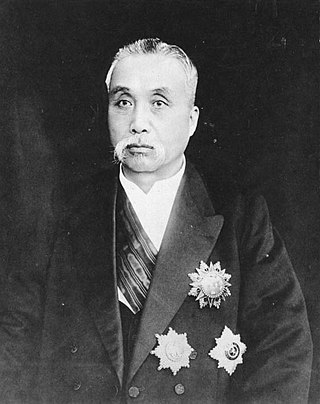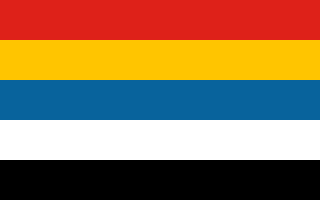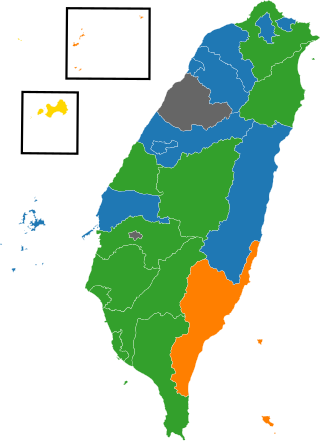
Xu Shichang was the President of the Republic of China, in Beijing, from 10 October 1918 to 2 June 1922. The only permanent president of the Beiyang government to be a civilian, his presidency was also the longest of the warlord era. Previously, he was Minister of the Cabinet of the Imperial Cabinet during the Qing Dynasty.
In Taiwan, parliamentary elections are held every four years to elect the 113 members of the Legislative Yuan, the unicameral legislature of Taiwan. The current electoral system was introduced in 2008. The constitutional amendments of 2005 extended term length from three to four years, reduced seat count from 225 to 113, and abolished the National Assembly, originally another governmental organ equivalent to a chamber of parliament.

General Cao Kun was a Chinese warlord and politician, who served as the President of the Republic of China from 1923 to 1924, as well as the military leader of the Zhili clique in the Beiyang Army; he also served as a trustee of the Catholic University of Peking.

The Beiyang government, officially the Republic of China, sometimes spelled Peiyang Government, was the government of the Republic of China which sat in its capital Beijing between 1912 and 1928. It was internationally recognized as the legitimate Chinese government during that time.

The Zhili clique was one of several mutually hostile cliques or factions that split from the Beiyang clique during the Republic of China's Warlord Era. This fragmentation followed the death of Yuan Shikai, who was the only person capable of keeping the Beiyang Army together. It was named for the general region of the clique's base of power, Zhili Province, now Hebei, and during its height also controlled Jiangsu, Jiangxi, and Hubei.

The Beijing Coup refers to the October 1924 coup d'état by Feng Yuxiang against Chinese President Cao Kun, leader of the Zhili warlord faction. Feng called it the Capital Revolution. The coup occurred at a crucial moment in the Second Zhili–Fengtian War and allowed the pro-Japanese Fengtian clique to defeat the previously dominant Zhili clique. Followed by a brief period of liberalization under Huang Fu, on November 23 this government was replaced by a conservative, pro-Japanese government led by Duan Qirui. The coup alienated many liberal Chinese from the Beijing government.

Local elections were held in Taiwan on 1 December 2001 to elect magistrates of counties and mayors of cities, on 26 January 2002 to elect councillors in county/city councils and mayors of townships and cities, on 8 June 2002 to elect representatives in township/city councils and village chiefs, and on 7 December 2002 to elect mayors and councillors of special municipalities.

The 1911 Chinese provisional presidential election was the election held on 29 December 1911 during the Xinhai Revolution for the First Provisional President and Vice President of the Provisional Government of the Republic of China. Sun Yat-sen and Li Yuan-hung were elected as President and Vice-President respectively. Sun sworn in at midnight on 1 January 1912 and declared the official establishment of the Republic of China.

The 1912 Chinese provisional presidential election were the elections held on 15 February and 20 February 1912 in Nanjing for the second provisional President and Vice President of China.

The 1913 Chinese presidential election were the election held on 6 and 7 October 1913 in Beijing for the first formal President and Vice President of China. The incumbent Yuan Shikai and Li Yuanhong were elected by two houses of the National Assembly.
The 1916 Chinese vice presidential by-election were a by-election held on 30 October 1916 in Beijing for the Vice President of China due to the vacancy left by incumbent Li Yuanhong as he replaced Yuan Shikai as president after Yuan's sudden death. Feng Guozhang of the Zhili clique won over Lu Rongting of the Old Guangxi Clique in the election.
The 1918 Chinese presidential election were the elections held on 4 September 1918 in Beijing for the second term of the President of China. Xu Shichang was elected by two houses of the National Assembly which were controlled by the Anfu Club formed in the National Assembly election in the same year.
By-elections for the Ninth Legislative Yuan were held in 2019, two on 27 January and four on 16 March, at Taiwan to elect 6 of the 113 members of the Legislative Yuan for the remaining term until 2020.
Local elections in Taiwan, also known as nine-in-one elections since 2014, are held to elect local officials and councillors in Taiwan.
This is a list of electoral districts for local council elections in Taiwan.
The 2015 Taiwanese legislative by-elections were held on 7 February 2015 in Taiwan to elect 5 of the 113 members of the Legislative Yuan for the remaining term until 2016. No change in the party composition of the Legislative Yuan resulted from the by-elections; three Democratic Progressive Party candidates won the seats vacated by DPP legislators, and two Kuomintang candidates won the seats vacated by KMT legislators.
The 2013 Taichung legislative by-election was held in Taiwan on 23 January 2013 for the Taichung City Constituency II after the former legislator Yen Ching-piao was disqualified for corruption.

Local elections were held in Taiwan in 1954, the second nation-wide elections in the post-war era of Taiwan, electing all 21 mayors of cities and magistrates of counties.










